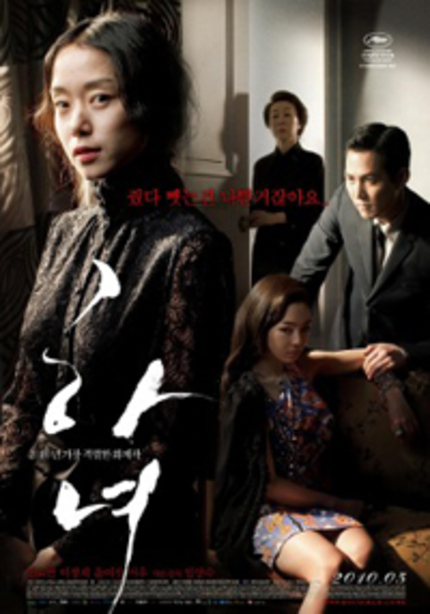THE HOUSEMAID review

Existing beneath its dethatched eroticism and simmering melodrama, there is a very classical element to "The Housemaid". It is, among other things, a fairy tale gone wrong, complete with a Snow White-innocent domestic housekeeper coming to live in a castle as a servant. There is even a wicked matriarchal figure; her last shred of moral fiber vanished long ago. But the handsome prince in this castle is devoid of valor and honor, a selfish rich man who takes what he wants no matter the consequence. The new young housemaid is, in part, there to "raise his kids" - but "Mary Poppins" this is not.
Taking a page from P.T. Anderson's "Magnolia" playbook, the films opens with a bizarre little set piece that proves to be directly or obviously apropos to nothing that follows. It begins on the neon-hued streets of the South Korean city, fueled by nightlife and people going about their business. Cut to a girl on a balcony, a few stories off the ground. As she crosses over the bars, her intent to jump becoming quickly clear, we are right there with her. Until we're not. Cut to the people below beginning to take notice. As she finally plummets to her death, there is the initial gasp of shock, quickly followed by a collective morbid desire to view the body. Perhaps I missed something in this single viewing, but who the jumper is and why she did what she did are never made clear. This prelude seems to exist purely as a thematic tone-setter, reminding us that even as the film quickly switches gears into the ultra-insular and cruel private world of a wealthy couple's household, there is a whole outside world that is equally cruel and tasteless in its own sick way.
Enter Eun-yi (Do-yeon Jeon), a well-meaning young girl of modest means who is hired by a local wealthy couple as a housemaid. The young daughter immediately voices her approval of the new hire, and an initial bond is formed with Haera (Seo Woo), the young, very attractive but also very pregnant lady of the house. It isn't long, however, before the grossly entitled husband, Goh Hoon (Lee Jungjae) comes onto Eun-yi. In the first minutes of his attempt, she, frightened and alone, tries to reject him. But she is quickly wooed, a classic case of rape-turned-seduction, and the beginning of an affair that will only produce dire consequences, every one of them crashing upon the head of Eun-yi. (As Alice Cooper has told us, Only Women Bleed.)
Billed as an erotic drama, the sex in the film is definitely of the intense variety. There's actually not that much of it, but when it happens, it plays either outright voyeuristically (an extreme wide shot, gazing downward at the husband power-tripping as his wife performs on him), or impressionistic on the verge of experimental (the housemaid heroine and the husband engaging in adultery, the audio uncomfortable in its you-are-there-directness, but the visual is that of unidentifiable anatomy, a flesh-on-flesh close-up, sweaty as it smacks repeatedly.) Both visual choices are absolute and direct, leaving no question we're seeing something not only private but in both cases, perverse. The film moves on from it unflinchingly, its integrity intact as ever.
The house itself, the core location of the film, is something out of an austere dream - an Apple store by way of Frank Lloyd Wright. With its open fire pits, ornate chandeliers and second floor hallway balconies, it's no surprise when a disaster straight out of 1976's "The Omen" occurs. Eun-yi finds herself in the hospital recovering from her terrible fall. Although she fares better than Lee Remick once did in nearly the same intentional "accident" (hers brought on by Haera's mother, Remick's of course brought on by young Damien), she is also informed that she is pregnant. Somehow, the all-knowing women of the house were already privy to this fact, and the scheming to get rid of the unborn baby is already in progress.
Exquisitely filmed and directed with unwavering sure-handed panache, "The Housemaid", while trying to seduce potential audiences with promises of eroticism, is actually a very blatant morality tale. Some have incorrectly dismissed it as nothing but a struggle between haves and have-nots, or as merely an upstairs-downstairs potboiler, clearly failing to appreciate the very intentional, very well crafted melodramatic core. (Lest we forget that melodrama has been a tremendously functional cinematic staple since the before D.W. Griffith.) Although director Im infuses the proceedings with subtle American film stylistic references and influences, the South Korean vibe is never forsaken. All of the performances are exceptional, particularly those of leading lady Do-yeon Jeon and Yun Yeo-Jong as the weary and hardened senior maid.
"The Housemaid" successfully and unflinchingly explores the corruptibility of even the best intentioned of people, and the cost that can accompany illicit actions. The deadened and dying souls that inhabit this story are far from indicative of the vibrant and even daring creative charge on behalf of the filmmakers. "The Housemaid", with its conniving women, oblivious man, and increasingly scarred children, makes no apologies as it boasts a jaw-dropping finale that filmgoers will not soon forget. Im's depiction of life in this odd microcosm is also an effective commentary on not just the growing human detachment in South Korea, but also the world.
- Jim Tudor

Do you feel this content is inappropriate or infringes upon your rights? Click here to report it, or see our DMCA policy.






